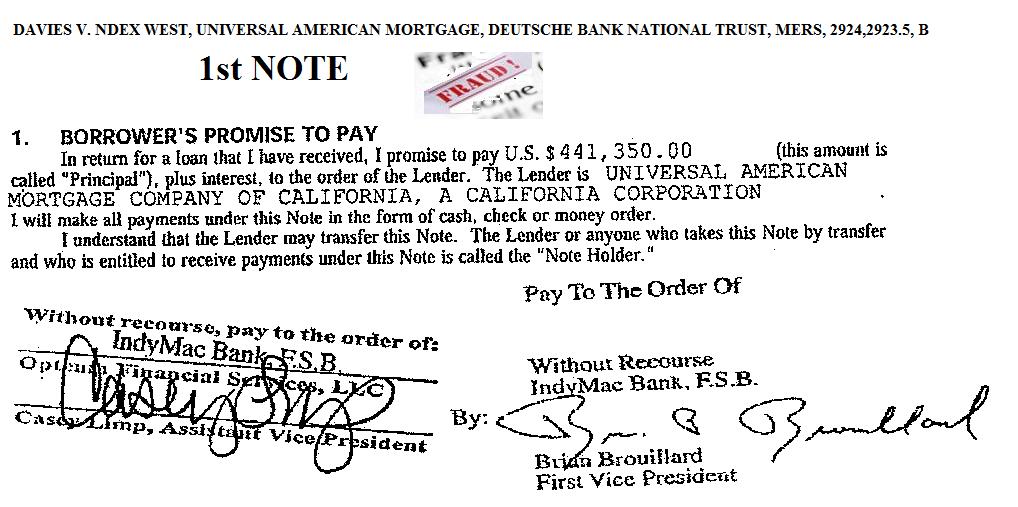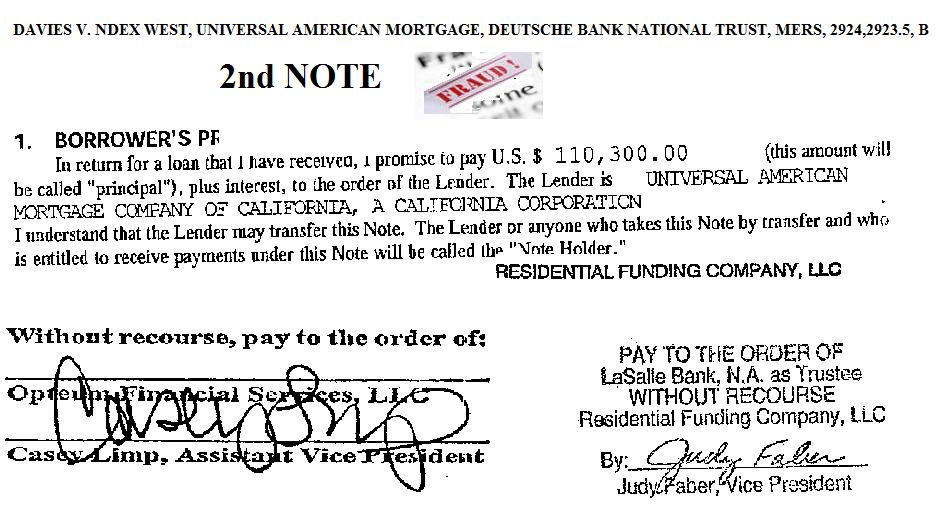IN THE UNITED STATES DISTRICT COURT
FOR THE DISTRICT OF OREGON
PORTLAND DIVISION
DAVID EKERSON,
Plaintiff,
v.
MORTGAGE ELECTRONIC
REGISTRATION SYSTEM, a
foreign corporation;
CITIMORTGAGE, INC., a foreign
corporation; and CAL-WESTERN
RECONVEYANCE, a foreign
conrporation,
Defendants.
11-CV-178-HU
TEMPORARY RESTRAINING ORDER
ALEX GOLUBITSKY
Case Dusterhoff LLP
9800 S.W. Beavterton-Hillsdale Hwy
Suite 200
Beaverton, OR 97005
(503) 641-7222
Attorneys for Plaintiff
BROWN, Judge.
This matter comes before the Court on Plaintiff’s Motion (#3) for a Temporary Restraining Order Pursuant to FRCP 65. For the reasons that follow, the Court GRANTS Plaintiff’s Motion and temporarily RESTRAINS Defendants from proceeding with the February 16, 2011, foreclosure sale of Plaintiff’s property.
BACKGROUND
The following facts are taken from Plaintiff’s Complaint:
On November 21, 2006, Plaintiff David Ekerson entered into a promissory note secured by property located at 622 S.E. 71st Street, Hillsboro, Oregon, pursuant to one or more deeds of trust recorded December 5, 2006. According to title records, Citibank was the original mortgagee.
At some point, it appears Defendant Mortgage Electronic Resolution System (MERS) became an assignee of the original lender under the Notes, and on October 12, 2010, MERS “grant[ed], assign[ed], and transfer[red]” to Defendant Citimortgage, Inc., “all beneficial interest under” the November 21, 2006, deed of trust. Decl. of Alex Golubitsky, Ex. D. Also on October 12, 2010, MERS evidently issued a Notice of Default to Plaintiff. MERS’s assignment to Citimortgage, however, was not recorded in Washington County’s records until two days later on October 14, 2010.
In his Complaint, Plaintiff alleges he believes Citimortgage is the “current servicer or owner of the loan, having been assigned the loan by Freddie Mac.” Plaintiff also believes Defendant Cal-Western Reconveyance (CWR) is the trustee in charge of the foreclosure sale.
Plaintiff’s property is scheduled to be sold at public auction on February 16, 2011, based on the Notice of Default that Plaintiff contends was improperly issued by MERS.
On February 10, 2011, Plaintiff filed a Complaint in this Court alleging Defendants violated Oregon’s Unfair Trade Practices Act, Or. Rev. Stat. §§ 646.608(1)(k) and 646.608(2)(n). Plaintiff seeks damages and a declaration as to (1) whether Defendants have standing to foreclose; (2) whether MERS “duly and appropriately recorded all assignments of the beneficial interest in the trust deeds” pursuant to Oregon Revised Statute § 86.735 and whether a nonjudicial foreclosure is allowed by statute; and (3) whether the right of the lender to impose a delinquency charge was properly disclosed in the initial loan agreement pursuant to the Truth in Lending Act (TILA), 15 U.S.C. § 1601, Regulation Z, Part 266.18.
On February 10, 2011, Plaintiff also filed a Motion for Temporary Restraining Order in which Plaintiff moves for the entry of an order preventing Defendants from proceeding with the proposed foreclosure sale of Plaintiff’s property on February 16, 2011.
STANDARDS
A party seeking a temporary restraining order or preliminary injunction must demonstrate (1) it is likely to succeed on the merits, (2) it is likely to suffer irreparable harm in the absence of preliminary relief, (3) the balance of equities tips in its favor, and (4) an injunction is in the public interest. Winter v. Natural Res. Def. Council, 129 S. Ct. 365, 374 (2008). “The elements of [this] test are balanced, so that a stronger showing of one element may offset a weaker showing of another. For example, a stronger showing of irreparable harm to plaintiff might offset a lesser showing of likelihood of success on the merits.” Alliance For The Wild Rockies v. Cottrell, No. 09-35756, 2011 WL 208360, at *4 (9th Cir. Jan. 25, 2011)(citing Winter, 129 S. Ct. at 392). Accordingly, the Ninth Circuit has held “‘serious questions going to the merits’ and a balance of hardships that tips sharply towards the plaintiff can support issuance of a preliminary injunction, so long as the plaintiff also shows that there is a likelihood of irreparable injury and that the injunction is in the public interest.” Id., at *7.
“An injunction is a matter of equitable discretion” and is “an extraordinary remedy that may only be awarded upon a clear showing that the plaintiff is entitled to such relief.” Winter, 129 S. Ct. at 376, 381.
DISCUSSION
I. Merits
Plaintiff seeks an order preventing Defendants from proceeding with the proposed foreclosure sale of Plaintiff’s property as scheduled because, among other things, Defendants “have not followed the appropriate procedures for recording all the deeds and assignments for this property, and therefore lack standing to foreclosure [sic] this property.” Specifically, Plaintiff contends MERS assigned its apparent beneficial interest in the property “to other parties who were not recorded in violation” of Oregon Revised Statute § 86.735.
In Burgett v. Mortgage Electronic Registration Systems, District Judge Michael Hogan explained the mortgage practice engaged in by MERS as follows:
“In 1993, the Mortgage Bankers Association, Fannie Mae, Freddie Mac, the Government National Mortgage Association (Ginnie Mae), the Federal Housing Administration, and the Department of Veterans Affairs created MERS. MERS provides ‘electronic processing and tracking of [mortgage] ownership and transfers.’ Mortgage lenders, banks, insurance companies, and title companies become members of MERS and pay an annual fee. They appoint MERS as their agent to act on all mortgages that they register on the system. A MERS mortgage is recorded with the particular county’s office of the recorder with ‘Mortgage Electronic Registration System, Inc.’ named as the lender’s nominee or mortgagee of record’ on the mortgage. The MERS member who owns the beneficial interest may assign those beneficial ownership rights or servicing rights to another MERS member. These assignments are not part of the public record, but are tracked electronically on MERS’s private records. Mortgagors are notified of transfers of servicing rights, but not of transfers of beneficial ownership.”
2010 WL 4282105, at *2 (D. Or. Oct. 20, 2010)(quoting Gerald Korngold, Legal and Policy Choices in the Aftermath of the Subprime and Mortgage Financing Crisis, 60 S.C. L.Rev. 727, 741-42 (2009)). In Burgett, the plaintiff, a mortgagee, brought an action against MERS and the servicer of the plaintiff’s mortgage loan alleging, among other things, a claim for breach of contract and seeking declaratory relief to prevent a foreclosure sale of his property. The plaintiff contended the MERS practice set out above was not permitted under Oregon trust-deed law because it allowed assignment of beneficial interests without recording. Id. The defendants moved for summary judgment. Judge Hogan noted the plaintiff’s contention did not “necessarily mean that the arrangement violates the Oregon Trust Deed Act such that foreclosure proceedings could not be initiated by MERS or its substitute trustee.” Id. Judge Hogan, however, denied the defendants’ motion for summary judgment as to the plaintiff’s request for declaratory relief and claim for breach of contract on the ground that the defendants failed to “record assignments necessary for the foreclosure.” Id., at *3. Judge Hogan reasoned:
Under ORS 86.705(1) a “‘Beneficiary’ means the person named or otherwise designated in a trust deed as the person for whose benefit a trust deed is given, or the person’s successor in interest, and who shall not be the trustee unless the beneficiary is qualified to be a trustee under ORS 86.790(1)(d).” Plaintiff contends that MERS cannot meet this definition because there is no evidence that the trust deed was made to benefit MERS. However, the trust deed specifically designates MERS as the beneficiary. Judge Henry C. Breithaupt provides a persuasive discussion related to this issue:
[T]he interest of MERS, and those for whom it was a nominee, in question here was recorded and known to Plaintiff when it received the litigation guarantee document prior to starting this action.
The Statutes do not prohibit liens to be recorded in the deed of records of counties under an agreement where an agent will appear as a lienholder for the benefit of the initial lender and subsequent assignees of that lender-even where the assignments of the beneficial interest in the record lien are not recorded. It is clear that such unrecorded assignments of rights are permissible under Oregon’s trust deed statute because ORS 86.735 provides if foreclosure by sale is pursued all prior unrecorded assignments must be filed in connection with the foreclosure. The trust deed statutes therefore clearly contemplate that assignments of the beneficial interests in obligations and security rights will occur and may, in fact, not have been recorded prior to foreclosure. The legislature was clearly aware such assignments occurred and nowhere provided that assignments needed to be recorded to maintain rights under the lien statutes except where foreclosure by sale was pursued.
Letter Decision in Parkin Electric, Inc. v. Saftencu, No. LV08040727, dated March 12, 2009 (attached as Exhibit C to the second declaration of David Weibel (# 60)).
The problem that defendants run into in this case is an apparent failure to record assignments necessary for the foreclosure. As Judge Breithaupt notes, ORS § 86.735 provides that if foreclosure by sale is pursued, all prior unrecorded assignments must be filed in connection with the foreclosure. ORS § 86.735(1) specifically provides The trustee may foreclose a trust deed by advertisement and sale in the manner provided in ORS 86.740 to 86.755 if:
(1) The trust deed, any assignments of the trust deed by the trustee or the beneficiary and any appointment of a successor trustee are recorded in the mortgage records in the counties in which the property described in the deed is situated.
Id., at *2-*3. Judge Hogan noted Oregon Revised Statute § 86.735 requires any assignments of the trust deed by the trustee or the beneficiary and any appointment of a successor trustee to be recorded. The record in Burgett, however, did not reflect all transfers to the subsequent lenders/servicers had been recorded.
Id.
Similarly, in Rinegard-Guirma v. Bank of America, District Judge Garr M. King granted the plaintiff, a mortgagee, a temporary restraining order against the defendants, MERS and others, prohibiting the defendants from conducting a foreclosure sale of the plaintiff’s home because the plaintiff established “nothing [was] recorded with Multnomah County [that] demonstrates that LSI Title Company of Oregon, LLC is the successor trustee.“ No. 10-CV-1065-PK, 2010 WL 3655970, at *2 (D. Or. Sept. 15, 2010). Judge King reasoned:
Pursuant to ORS 86.790, the beneficiary may appoint a successor trustee. However, only “[i]f the appointment of the successor trustee is recorded in the mortgage records of the county or counties in which the trust deed is recorded” is the successor trustee “vested with all the powers of the original trustee.” ORS 86.790(3). Accordingly, unless the appointment of LSI Title Company of Oregon, LLC was recorded, the purported successor trustee has no “power of sale” authorizing it to foreclose Rinegard-Guirma’s property. See ORS 86.710 (describing trustee’s power of sale); ORS 86.735 (permitting foreclosure by advertisement and sale but only if “any appointment of a successor trustee [is] recorded in the mortgage records in the counties in which the property described in the deed is situated”).
Similarly, she is likely to experience irreparable harm if her home is foreclosed upon.
Id.
Plaintiff also contends this foreclosure proceeding is defective because there has not been established any basis in law for Defendants to have assessed a $77,000.00 delinquency charge which far exceeds the actual loan balance. Plaintiff contends this is a violation of TILA.
The Court finds persuasive the reasoning in Burgett and Rinegard-Guirma as to MERS status in the case on this record. The Court, therefore, concludes Plaintiff has established he is likely to succeed at least as to his request for declaratory judgment related to Defendants’ failure to comply with Oregon Revised Statute § 86.735. Plaintiff also has established MERS, who was the recorded beneficiary of the trust deed, assigned successor trustees to the trust deed but failed to record the appointment of any successor trustee as required before a nonjudicial foreclosure sale may be conducted under Oregon law.
The Court also finds there is a legitimate basis to be concerned that the alleged $77,000.00 delinquency has been assessed improperly. Plaintiff also has established he is likely to experience irreparable harm if the scheduled foreclosure proceeds unabated. The Court, therefore, concludes the balance of hardships tips sharply in Plaintiff’s favor, and there are at least serious questions as to the merits of Plaintiff’s request for declaratory judgment.
Accordingly, the Court GRANTS Plaintiff’s Motion for a Temporary Restraining Order and hereby RESTRAINS
Defendants from proceeding with the February 16, 2011, foreclosure sale of Plaintiff’s property.
II. Notice under Federal Rule of Civil Procedure 65
Federal Rule of Civil Procedure 65(b) provides in pertinent part:
(1) Issuing Without Notice. The court may issue a temporary restraining order without written or
oral notice to the adverse party or its attorney only if:(A) specific facts in an affidavit or a verified complaint clearly show that immediate and irreparable injury, loss, or damage will result to the movant before the adverse party can be heard in opposition; and
(B) the movant’s attorney certifies in writing any efforts made to give notice and the reasons why it should not be required.
Here the Court issues the order temporarily restraining Defendants from proceeding with the proposed foreclosure sale of Plaintiff’s property without notice to Defendants because there is insufficient time before the scheduled foreclosure sale to compel Defendants to appear and to respond to the Motion. In addition, Plaintiff’s counsel has made reasonable efforts to notify Defendants and has been unsuccessful in securing the presence of a responsive party.
Finally, the Court concludes the risk of irreparable harm to Plaintiff is significant when weighed against the temporary delay authorized by this Order.
III. Security
Pursuant to Rule 65(c), the Court requires Plaintiff to post a $500.00 bond by 4 p.m., Monday, February 14, 2011, as a reasonable security for any costs or damages sustained by any party found to have been wrongfully restrained.
CONCLUSION
For these reasons, the Court GRANTS Plaintiff’s Motion (#3) for a Temporary Restraining Order and hereby RESTRAINS Defendants from proceeding with the February 16, 2011, foreclosure sale of Plaintiff’s property. The Court DIRECTS Plaintiff to post a $500.00 bond by 4 p.m., Monday, February 14, 2011.
IT IS SO ORDERED.
DATED this 11th day of February, 2011.
This order is issued on February 11, 2011, at 5:00 p.m., and expired on February 25, 2011, at 5:00 p.m., unless extended by order of the Court.
/s/ Anna J. Brown
ANNA J. BROWN
United States District
[ipaper docId=48775940 access_key=key-o6272eyqn10csz2bm14 height=600 width=900 /]
© 2010-19 FORECLOSURE FRAUD | by DinSFLA. All rights reserved.








Recent Comments